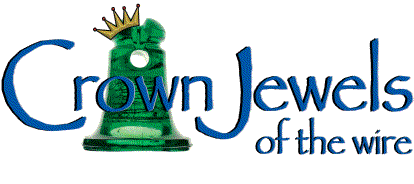Porcelain Insulator News
by Jack H. Tod, NIA #13
Reprinted from "INSULATORS - Crown Jewels of the Wire", January 1979, page 24
Dear Jack:
The cover of the October "Crown
Jewels" with the "Insulators Around the World" photo prompted me
to write to you. My associate at work, Mr. Nathan Iyer, who knows of my
insulator collecting, returned from a trip to India and presented me with 2
porcelain items. He obtained them in the town of Ahmedabad, in the central
telephone building. They appear to be of recent manufacture; the markings read
"1S2 / Bengal Potteries / 1972-73". I thought these might be of
interest to you and our fellow collectors.
All the best,
Michael Dowhan
New
York, NY N.I.A. #1524

Many thanks to Michael for loaning these to us for this
report. The above drawing is by shadow profile, and the underglaze marking on
each specimen is inverted on the skirt. The glaze is off-white color, and the
firing rest was the unglazed pin hole (5/8" size, thread pitch of 6 per
inch).
This general style (with either recessed or extended petticoat) seems to
be nearly the standard telephone pin type used for many years outside of North
America. The U.S. styles also had tiny conductor grooves until we learned better
about 75 years ago!
Jack

Lew Hohn (Rochester, NY) reported some time back
of a couple of unusual items at the Capitol District Insulator Show last
September.
First, this top rest signal brought to the show by Ted Church for Lew
to see. Ted found it in an antique shop. Lew says, "Everything about it
points to Thomas." Maybe so, Lew, but my new crystal ball says it's a
Canadian Porcelain Company item.
Lew also picked up a white U-344A by Pittsburg
at the show and thinks that one is a little hard to find. I think that's an
understatement; I haven't ever heard of a white specimen of this general
style.

Dear Jack:
I found this white crock (not shiny) F. M. Locke 1893 along an
old trolley line between Oil City and Franklin, Pa. It's a mystery to me, and
could you tell me its use? It doesn't look too valuable. Glass turns me on.
Ora
G. Beary
Venus, Pa.
- - - - - - - - -
Dear Ora:
Your Fred Locke item is the porcelain base
portion of a "porcelain base pin assembly", and the purpose of these
types of pins was to reduce the burning (charring) of insulator pins by
lightning-caused flashovers. They were made in many different sizes, since the
many styles of insulators required a variety of different insulator pins for
their mounting.
After the Locke patent expired in 1910, these porcelain-base pins
were made by a number of other porcelain insulator manufacturers for many years
-- up into the 1920's at least, but probably into the 1930's.
The very earliest
ones made by Fred Locke are crude, unglazed and bear this handstamp with the
date error as shown above. The correct date is 3/14/93 (patent #493,434). Later
ones, made for Locke by Imperial, are of very good quality and bear a wordy
recess-embossed marking on the bottom side. By about 1898, Fred Locke was making
these in his own plant. The ones made after the Fred Locke era are all unmarked.
This is a desirable item to Fred Locke specialists, and this early
unglazed one would have a trade value in the $5 range -- or more for complete pin
assemblies with this item attached. Later versions, unmarked and with either
white or brown glaze, are much more common and would have much less appeal to
collectors....
It could be that some of the porcelain pin types you've found in
this same are very old types of good value. Porcelain turns some people on! I
suggest that before you trade them you first check with a collector who knows
porcelain values. Nothing like trading goody porcelain items for glass
nothniks, unless that turns you on.
Jack
Charles Schmaldienst (Winooski,
Vermont) reported several nice items,. one of which was a Hartford (marking H /
A105) in white. can't recall of ever having seen a white Hartford before, so
that's probably rated a goody for sure.
Best of all, Charles has a U-746,
beautiful mahogany glaze, and with "Pittsburg" stamped an the crown's
side. No doubt about that one being a goody; I know of only two other unipart
pin types with the "Pittsburg" marking, and one of those changed hands
at the NIA National last summer in Reno for a tidy $75.00. It was maybe even a
bargain at that level?
Here's a portion of some correspondence which may give
you some insight (& also envy) to insulator collecting in Europe. Wayne and
Dolores now live in West Germany where he is the Market Manager (Europe) for
P.T.T. & Public Radio Systems, a communications division of Motorola, Inc.
Dear Jack:
... I manage to pick up insulators from all over Europe & Africa
in my "towns and travels" with my job. So far I have pieces from
Norway, Germany, France, U.K., Spain, Portugal, Kenya, etc., but can find very
little info on foreign insulators -- most of which are porcelain. If you know of
any publications, please let me know.
I am fairly new in the insulator
collecting game but already correspond with some U.S. collectors who have
contacted me, since I am the only European member listed in the N.I.A. directory
[March Crown Jewels]. I am considered a real "nut" here by my
colleagues for my unusual hobby.
I get most of my pieces directly from the
P.T.T.'s or by walking pole lines. I have never seen an insulator for sale here
at a flea market or anything such as that. The hobby just hasn't come here yet
so, you're right, competition is minimal for the pieces available....
Wayne Dixon, N.I.A. #1525
Mosbacher Strasse 5
62 Wiesbaden, West Germany
| 